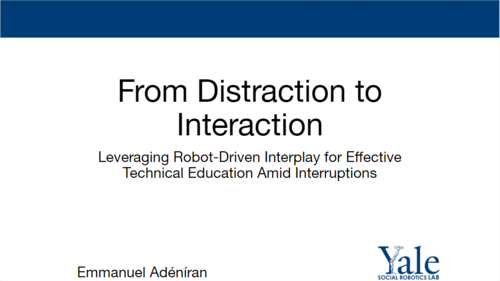
Lab member Emmanuel Adéníran defended his dissertation “From Distraction to Interaction: Leveraging Robot-Driven Interplay for Effective Technical Education Amid Interruptions” today. The presentation slides from his defense can be found here.
Abstract:
This dissertation investigates the dynamic interplay between robotics and human adaptability in environments characterized by frequent interruptions, with a special focus on technical education and privacy considerations. Our research begins by examining the pervasive issue of interruptions in various settings, emphasizing their impact on productivity and safety. It then explores strategies that leverage technology, particularly robotics, to enhance human interruption tolerance and performance.
A significant portion of the research is dedicated to understanding how robotics can aid individuals with Autism Spectrum Disorders (ASD). This exploration is extended to broader educational contexts, where robotics are employed to improve learning outcomes and skill acquisition in technical education. We conduct empirical studies to validate the model’s effectiveness, focusing on learning outcomes, skill development, and the productive interaction between robots and human learners.
Additionally, the dissertation addresses the crucial aspects of privacy and ethical design in the deployment of robotics, highlighting the importance of aligning technological advancements with ethical standards and privacy concerns. Advanced techniques like differentially private algorithms and maximal information coefficient analysis are discussed, underscoring their role in maintaining data utility while protecting individual privacy.
The key contributions of our research include providing broad understanding of the role of technology, particularly robotics, in enhancing human adaptability in environments characterized by frequent interruptions; offering insights into the importance of privacy and ethical design in the development of user-centric robots; presenting evidence of the effectiveness of a robot-driven interactive learning model in various fields of technical education; and demonstrating the applicability of robot-driven pedagogical methods beyond specific disciplines, showcasing the versatility of our approach in various training settings.
Advisor: Brian Scassellati
Other committee members:
Joan Feigenbaum
Tesca Fitzgerald
Greg Trafton (Naval Research Laboratory in the Artificial Intelligence Center)